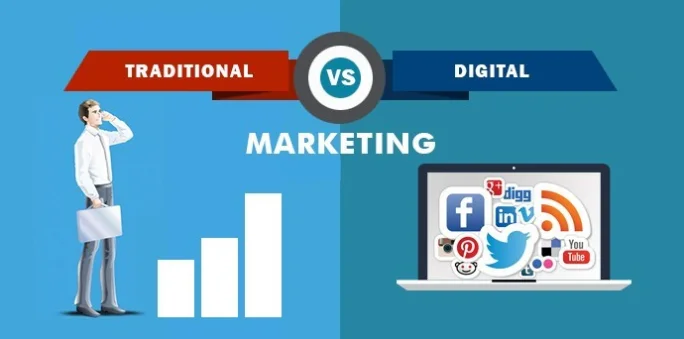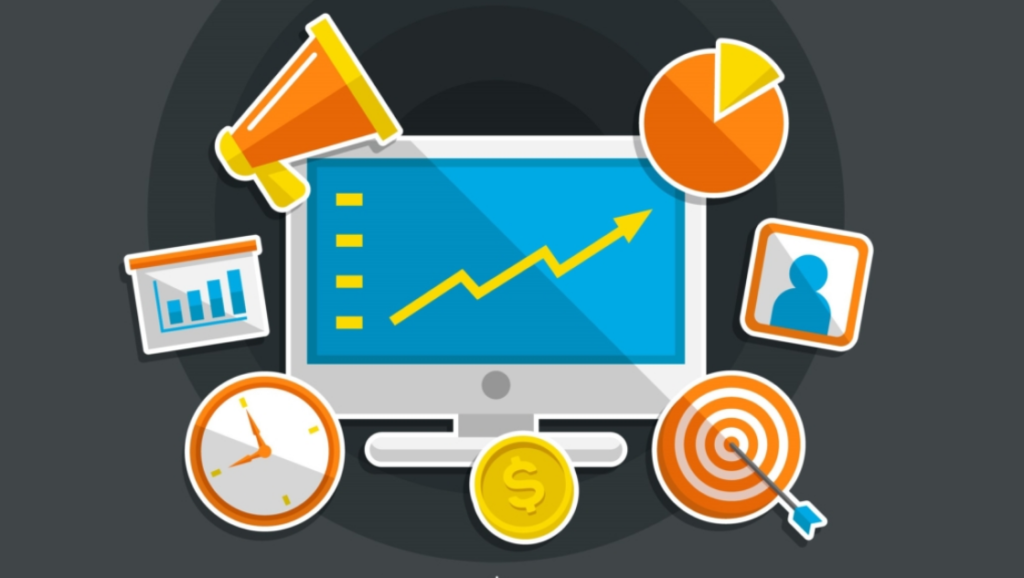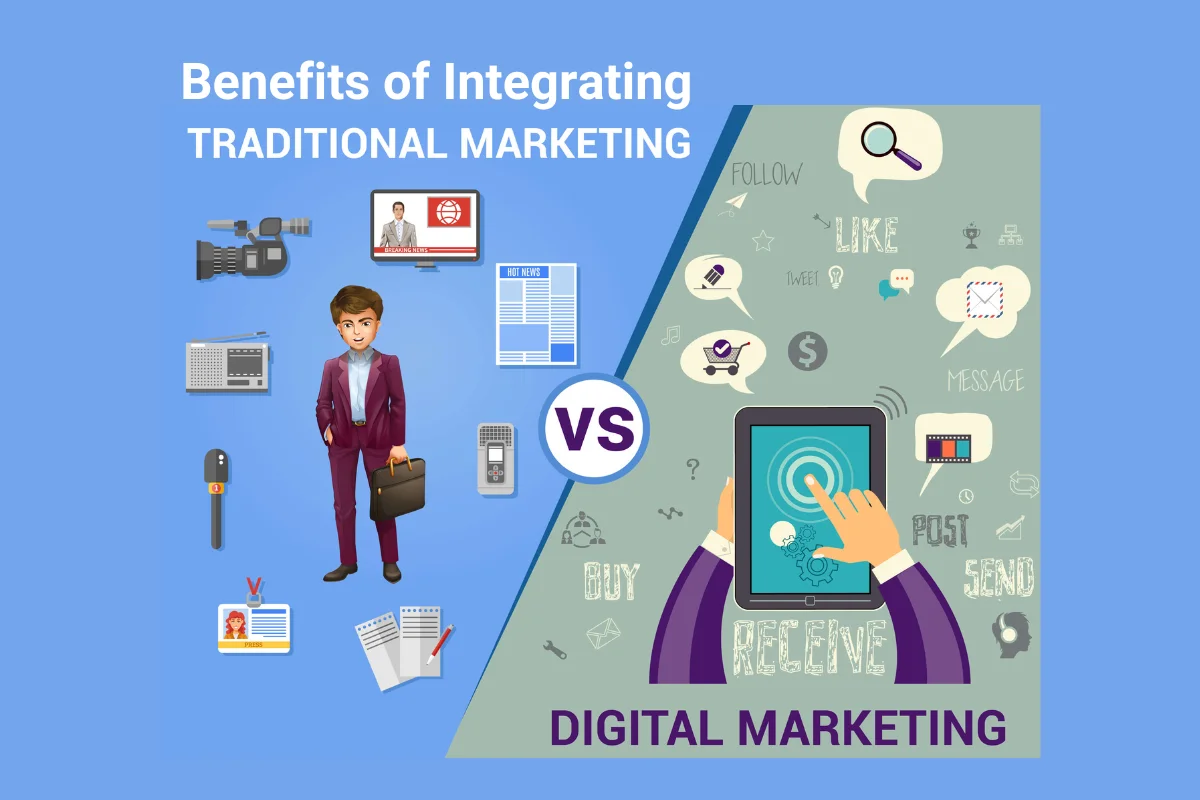As we move into 2024, digital marketing has truly become a game-changer for generating revenue. There was a time when agencies mainly used print media—things like radio, TV ads, mail campaigns, and billboards—to get their message out. Now, with the rise of social media platforms and search engines, we’ve seen a shift towards online marketing. But that doesn’t mean traditional methods have faded away. By integrating traditional and digital marketing, brands can create a well-rounded strategy that combines the best of both worlds, keeping both approaches relevant and impactful.
This article will explain how combining both marketing methods can impact your business
Integrating Traditional And Digital Marketing Channels
Every individual uses the internet when it comes to buying or searching for any product/service. Allowing brands to grab their attention through numerous paid and organic marketing tactics like running ads. However, combining both offline and online marketing can make it easy for a business to reach a wider audience.

It helps a business use the strengths of both traditional and digital marketing to raise brand awareness, increase audience engagement and drive huge ROI. This approach is also known as a 360-degree marketing strategy.

Let’s explore the advantages
Wider Audience Reach
Reaching a maximum audience is the key to success for any digital marketing agency. The more audience you have, the more your chances of sales will increase. Some companies use social media platforms to engage with people while others run paid ads.
Through combining both online and offline channels you have the option to target a wider audience. When your business is sending emails along with giving ads in newspapers. This will help you to cover more audiences and generate high-quality leads by developing lasting relationships.
Enhanced Customer Engagement
Traditional marketing channels often lack the immediate feedback that digital channels provide. By integrating the two, you can create a more interactive experience for your customers. For example, you can run a TV ad that encourages viewers to visit your website or social media page for exclusive content.
This integration allows you to engage with your audience across multiple touchpoints, increasing their involvement with your brand.
Improved ROI
Combining traditional and digital marketing channels can lead to a higher return on investment (ROI). Traditional marketing methods can be expensive, but when paired with cost-effective digital strategies, you can optimize your budget.
For instance, you can use digital analytics to track the effectiveness of a print campaign and adjust your strategy accordingly. This data-driven approach ensures that your marketing efforts are both efficient and effective.
Better Data Collection and Analysis
Digital marketing channels offer valuable insights into customer behavior, preferences, and demographics. When integrated with traditional marketing, you can collect data from multiple sources, providing a comprehensive view of your audience.
This data allows you to fine-tune your marketing strategies, create personalized content, and make informed decisions that drive better results.
Cross-Channel Promotion
Integration allows for seamless cross-channel promotion. For example, a print ad can include a QR code that directs customers to your online store, or a social media post can promote an upcoming TV commercial. This cross-promotion not only increases engagement but also enhances the overall effectiveness of your marketing campaigns by driving traffic between channels.
Targeted Campaigns
While traditional marketing often targets a broad audience, digital marketing allows for more targeted campaigns. By integrating both, you can leverage the broad reach of traditional marketing while using digital tools to target specific demographics.
This ensures that your campaigns resonate with the right audience, leading to higher conversion rates.
Greater Flexibility and Adaptability
Digital marketing channels offer greater flexibility and adaptability compared to traditional methods. By integrating the two, you can quickly respond to market changes and customer feedback. For example, if a print campaign isn’t performing well, you can use digital channels to make real-time adjustments.
Such as updating content or changing the target audience. This flexibility helps you stay competitive and relevant in a rapidly changing market.
Comprehensive Marketing Strategy
An integrated approach allows you to create a more comprehensive marketing strategy. By leveraging the strengths of both traditional and digital channels, you can cover all bases and ensure that your message reaches your audience at every stage of the buyer’s journey.

This holistic approach increases the chances of converting prospects into loyal customers. However, you have to keep a check on both marketing channels’ progress and make necessary adjustments.
Strengthened Customer Relationships
Integrating traditional and digital marketing channels helps build stronger relationships with your customers. Traditional channels, like direct mail or phone calls, offer a personal touch, while digital channels provide convenience and immediacy.
By combining both, you can create a balanced approach that meets the needs of your customers and fosters long-lasting relationships. However, you have to be efficient when it comes to responding to customers.
Whether it is an online or offline channel you must reply to customer feedback and solve his concerns. It increases likelihood of building customer loyalty towards your brand.
Conclusion
Integrating traditional and digital marketing channels is not just a trend; it’s a strategic move that can significantly enhance your marketing efforts. By combining the broad reach of traditional marketing with the precision and interactivity of digital channels, you can create a more effective, efficient, and comprehensive marketing strategy. This integration not only increases your brand’s visibility but also improves customer engagement, ROI, and overall business success.
Read more : Why Every Business Needs a Digital Marketing Audit
FAQs
Integrating these channels allows you to reach a wider audience and maintain consistent brand messaging across all platforms.
By combining cost-effective digital strategies with traditional methods, you can optimize your budget and track the effectiveness of your campaigns, leading to better ROI.
Yes, it creates a more interactive experience by engaging customers across multiple touchpoints, increasing their involvement with your brand.
It provides a comprehensive view of your audience by collecting data from multiple sources, allowing you to fine-tune your marketing strategies for better results.

Alex Mitch
Welcome to my blog! With over 10 years in digital marketing, I’ve seen its incredible impact on smaller businesses. Join me as we explore how digital marketing can grow your audience and boost your business. Whether you’re an experienced entrepreneur or just starting out, you’ll find practical tips and insights to enhance your digital marketing strategies.





